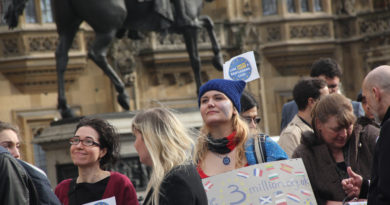EU-UK talks: two areas of contention on citizens’ rights
The president of the European Commission, Jean-Claude Juncker, said at a press conference on April 29 that the EU Brexit team has prepared the text for an agreement on citizens’ rights. This would put an end to the uncertainty faced since the EU referendum of June 2016 by EU nationals living in the UK and Britons elsewhere in the EU. The agreement could be adopted immediately if the British government would sign up to it, but Juncker added this will probably not happen.
Details then emerged about a dinner at 10 Downing Street, where Juncker was invited with EU Brexit negotiator Michel Barnier and part of his team to start discussing Brexit. Information about the dinner leaked to German media revealed areas of disagreement between the EU and the UK. One of them is citizens’ rights.
Based on media reports, the British government believes the issue could be solved with a statement at the European Council in June. Prime Minister Theresa May said in a recent BBC interview: “I’ve always said that I want this to be an issue that we address at an early stage.”
“I’ve always said that there are complexities to this issue and lots of details that will need to be agreed. What people want to know is to have some reassurance about their future. I believe we can give that at an early stage. I’ve got the will to do this,” she continued.
For the EU, this approach underestimates the technical details and does not offer concrete safeguards. “It is not about some general principles, it is about real guarantees, which have to be given to people on whose lives, Brexit intervenes sometimes in a tragic way,” said Juncker.
“The single and not simple question of citizens’ rights is in fact a cortege of 25 different questions which have to be solved, so this will take time and if we want to be precise and to deliver guarantees to citizens, this will take a huge amount of time. Although as Commission, we have already prepared a text which could be adopted immediately if our British friends would be ready to sign it like that, but that will probably not happen.”
What’s behind these statements?
On the basis of the EU position, media reports and recent statements, tthere are two areas of contention on citizens’ rights.
The first is about which rights will be guaranteed. EU citizens (including British living in other EU countries) benefit from a number of rights, including moving with their family members – regardless of their nationality – to other EU countries, working and setting up business, benefiting of social security, education and health care, having qualification recognised and more. The EU would want all these rights to continue to apply to expats affected by Brexit for their entire lifetime.
The white paper published by the British government confirms a general willingness to guarantee EU citizens’ rights, but does not specify the details. The problem is that, once detached from EU directives, British law is more conservative. For example, it is more restrictive on rights granted to spouses and family members who are not from the European Economic Area (EEA). This would mean that in the UK, EU nationals could potentially end up having more rights than British citizens.
At a meeting on free movement organised in London by the European parliament, Vicky Ford, a Conservative Member of the European Parliament and candidate in the general election, said it would be problematic if EU citizens had more rights than the Brits. “They should be treated equally with UK citizens,” she told the audience. On the other hand, EU nationals (and their governments) may find difficult to accept a loss of benefits compared to their current status, also considering they did not have a say in the Brexit decision.
Whichever set of rights will be guaranteed, the second difficulty is about the enforcement of the decision and who will be the judge in case of disputes. The European Union says the jurisdiction of the European Court of Justice should continue to apply after Brexit on this issue. For the UK, however, Brexit also means no longer be subject to the rulings of the European Court of Justice. The British government wants to guarantee rights of EU nationals through domestic law. Its plan is to transpose EU legislation into national law with the Great Repeal Bill and make changes in the future with the parliament’s approval. This means guarantees offered now could be easily overturned in the future.
The consequences of this approach have been highlighted in a report by the House of Lords EU justice sub-committee. Peers advised to protect expats’ rights through an international agreement rather than national legislation which could be modified by a new political will.
Colin Yeo, immigration barrister, wrote in his blog: “It is also difficult for the EU to trust the UK on citizens’ rights given the UK is thought to be in breach of existing EU law already in several different ways. If the UK is breaching EU law already, how can the UK be trusted to stick to any new agreement?”
A solution suggested by Marta Pont of European Citizen Action Service (ECAS), an interest group in Brussels specialised on free movement, is to establish a joint committee tasked to resolve differences emerged from the Brexit agreement. Similar arrangements already exist with Switzerland.
These choices will have an impact not only on the 3 million EU nationals in the UK, but also on the 1.2 million Britons living in the EU27, as decisions will be made on the basis of reciprocity. As for the consequences of a no deal, no one knows what will happen.
In its position on Brexit published this week, the Irish government called for a comprehensive agreement on citizens’ rights “with appropriate enforcement provisions.”
“Ireland will advocate a strong and unified EU position on safeguarding the rights of EU citizens and their family members in the UK,” says the document. For Irish nationals, once the UK will be out of the European Union, Common Travel Area (CTA) arrangements that were in place prior to the EU membership will apply. But also in this case EU law provides for some rights not previously covered.
2 Irish position on UK/EU citizens. Strong support for protection but not specific about acquired rights or ECJ, the key stumbling blocks pic.twitter.com/MKeJOBVywe
— Steve Peers (@StevePeers) May 2, 2017
Claudia Delpero © all rights reserved.
Photo courtesy Pixabay.





Active Citizenship!
‘Retaining European Citizenship’ Initiative registered by the Commission this week.
One million endorsements required.
Please check
http://www.eucitizen2017.org